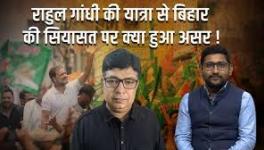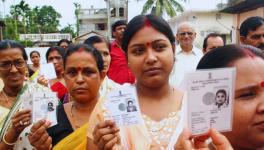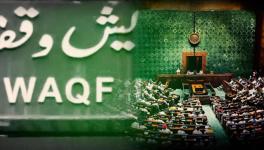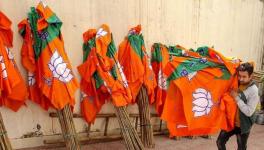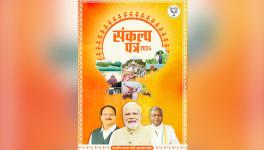Gujarat Elections: Is There a Pattern of ‘Misuse’ of Sec 144 to Bar Protests in Ahmedabad?
Representational use only.
On December 28, 2019, a protest against the Citizenship Amendment Act (CAA) was organised outside IIM Ahmedabad, where students from different parts of Gujarat had come to protest against the law and thepolice brutality that happened at Jamia Milia Islamia University, Delhi.
However, very soon, the protests had to be called off, and the gathered students were told they did not have permission to hold a protest. Later, many of the protestors were detained and kept at the Gujarat University police station.
In the past, the elections have never seen free speech as a matter of concern. Members of civil society, however, say that the strict crackdown on demonstrations has made them aware that this is an important issue ahead of the upcoming Assembly elections- whether it's the CAA-NRC protests or the farmers' movement, the most recent example being the refusal to allow a padyatra (march on foot) from Godhra in support of Bilkis Bano to take place.
An advocate, who wishes to be anonymous, was given information about the incident and the detainees, after which he reached the ground. That was where he learnt from a senior journalist that Section 144 of the Criminal Procedure Code barring assembly and procession has been under operation in Gujarat since 2002.
"Every time one order of Section 144 is about to end, another one is brought into place," narrated Soparkar.
He tried to dig deep into the matter as the question of why the Section was being used so prominently, bothered him. Later, he filed a petition with regard to Section 144 only to learn that it was not this law that permitted the state to curb protests, but there was more to it.
"Section 144 being used to curb protests is a misconception. What plays a role here is a lot more complex. The police claims there is a law which makes it mandatory for protestors to seek permission," Soparkar said.
There are cases where Section 144 has been used in the case of minority activists in Ahmedabad, to an extent where activists have been ‘banished’ from multiple districts of the state. One such case is of Kalim Siddiqui, a prominent Muslim activist in the state. In an FIR against Siddiqui at the Ramol police station, he was charged under
Section 144, which was also used against him in court.
THE LEGAL BATTLE
In a conversation with the NewsClick, Soparkar explained how the tedious legality of the Gujarat State played with the ones wanting to raise their voice against the government or making any attempts to stand against them. Section 33(1) (o) of the Gujarat Police Act (GPA) gives power to the police to come up with new rules and regulations
for the conduct of people who want to carry out assembly or procession. Under that rule, it would be mandatory to seek permission.
"Earlier, under Section 33(1) (o), there was a sub-section mandating people to seek permission for processions and gatherings, but after the case of Himmat Lal K Shah, the Supreme Court struck it down and asked the authorities to come up with a new law which in principle would ask people to seek permission and criteria under which police
would give or not give permission to any protest would be mentioned but the text of the law is not available in the public domain. An RTI was filed by Swati Goswami and I, but was rejected in 2020. Until now, we do not have the text to the law which mandates citizens to seek permission for protests," Soparkar said.
Activists said that even though Section 144 does not have much role to play, the police often use it as a binding rule to not grant permission to them. They allege that it is very well used to deny them permissions without any discussions. However, the acceptance and denial of permission are quite selective. On the one hand, when a
protest against CAA by students was not allowed, and the students were detained, around the same time, a rally in favour of CAA was conducted by the then Chief Minister on December 19 2019. The police did not apply Section 144 there, and the rally was allowed.
"Where to regard and where to disregard a protest, it's all in the hands of the police here," added Soparkar.
PATTERNS IN GRANTING PERMISSION TO PROTEST
As per some local journalists, the continuous clamping of Section 144 has existed since 2002; however, as per online records, continuous orders can be found since 2016 -- not just in Ahmedabad but in other major cities, such as Surat, Baroda, Rajkot, etc.
"We tried looking for the law that prohibited us from protesting and asked us to seek permission for any protests that organisations or citizens held. We did not find anything as such," said Goswami,
another activist based in Ahmedabad.
In a counter affidavit filed by the respondents in regard to apetition regarding Section 144, the government replied: "The order of 144, which was sought to challenge(about the CAA protest on December 20 2019) has lived its life. Therefore, it is of no use now. Thecircumstances at that point in 2019 demanded sec 144 be imposed; therefore, it is not illegal." The government also says that the people were not detained for violation of Section144 but regarding
Section 68 of GPA.
The Supreme Court in January 2020 also ruled that Section 144 of the CrPC, imposing restrictions on citizens' fundamental right to assemble peacefully, cannot be invoked as a 'tool' to 'prevent the legitimate expression of opinion or grievance or exercise of any democratic rights.
The court's remarks assumed significance in the backdrop of the authorities invoking this provision frequently. In Ahmedabad, activists suggest this order has had a negligible impact. If the police primarily do not state Section 144 as a reason to post the order, the one with mandatory permission is used against them.
NewsClick tried to meet several activists and citizens from varied backgrounds to understand which protests were being allowed by the police.
Goswami said: "Most of the protests allowed are either in a low visibility area or are held by senior academicians. The moment the permission letter goes under the name of an identified activist, we know we will not get permission for it."
"The police leave no stone unturned in hiding us even when we are in the visibility range of a common person, a place where many citizens would come. We were once protesting outside Sabarmati Ashram, and the police cleverly stationed their vehicles right in front, blocking the placards we were trying to show," a senior activist from Ahmedabad said.
Bhavesh is a researcher and an aware citizen of Ahmedabad. Although he does not identify himself as an activist, he believes that citizens should be a part of such protests wherever required and that the police have been hindering the right to free speech and assembly in Ahmedabad. While narrating several other problems in Ahmedabad, Bhavesh said: "We do not have a lot of public spaces where protests can be held. Mumbai has Azad Maidan, and Delhi has Jantar Mantar, JNU and Jamia; we do not have such space. This is another reason why the number of protests is declining".
Currently, the matter related to Section 144 and seeking permission before any gathering is being heard in the Gujarat High Court and is in the stage of oral arguments.
The writer is a freelance journalist based in Delhi and is travelling to Gujarat to report on the Assembly elections.
Get the latest reports & analysis with people's perspective on Protests, movements & deep analytical videos, discussions of the current affairs in your Telegram app. Subscribe to NewsClick's Telegram channel & get Real-Time updates on stories, as they get published on our website.









